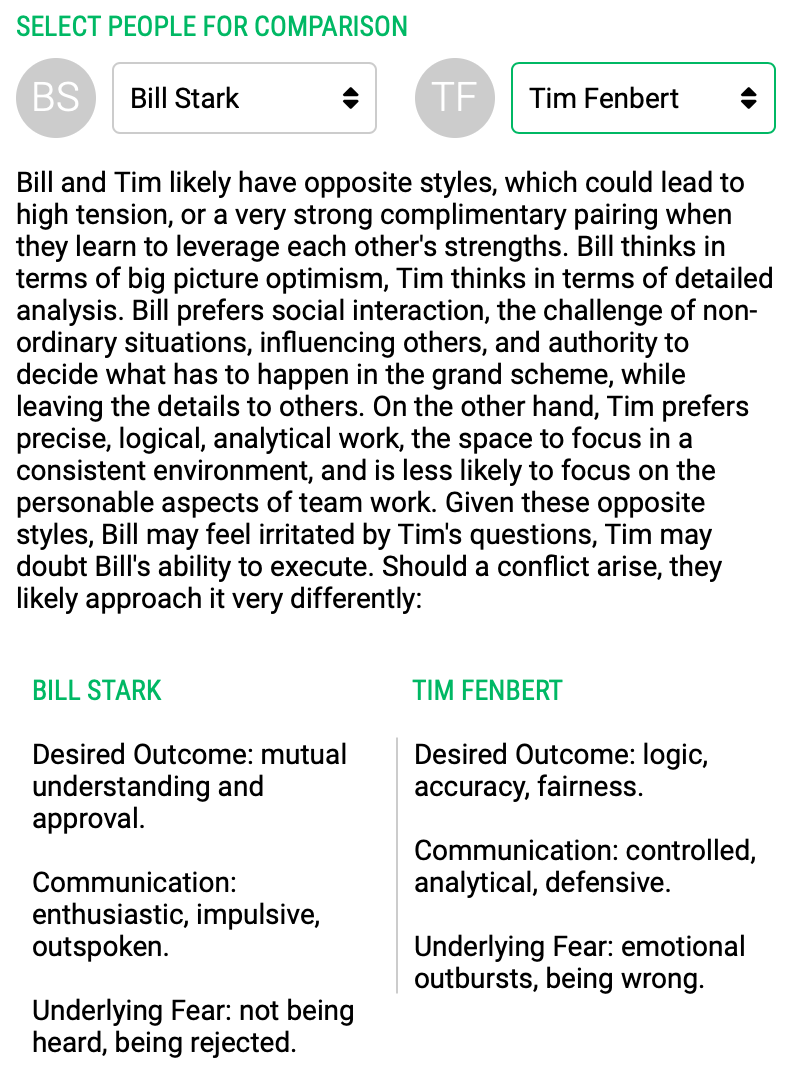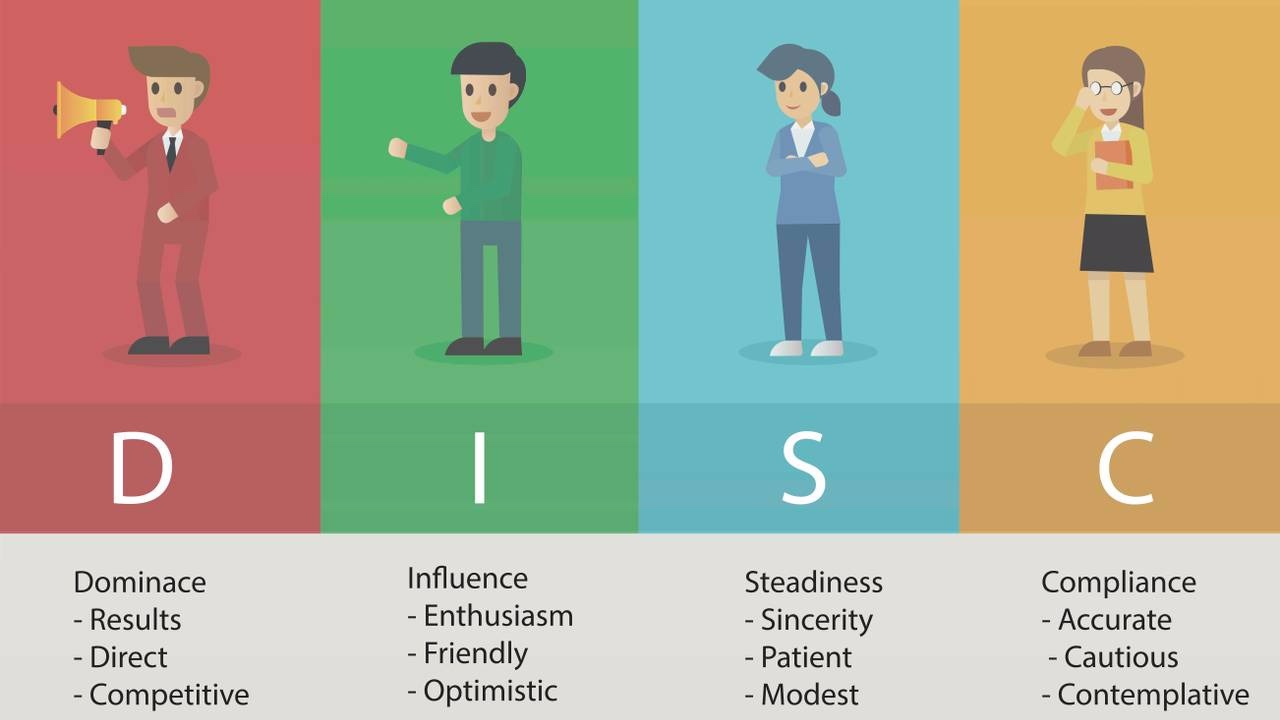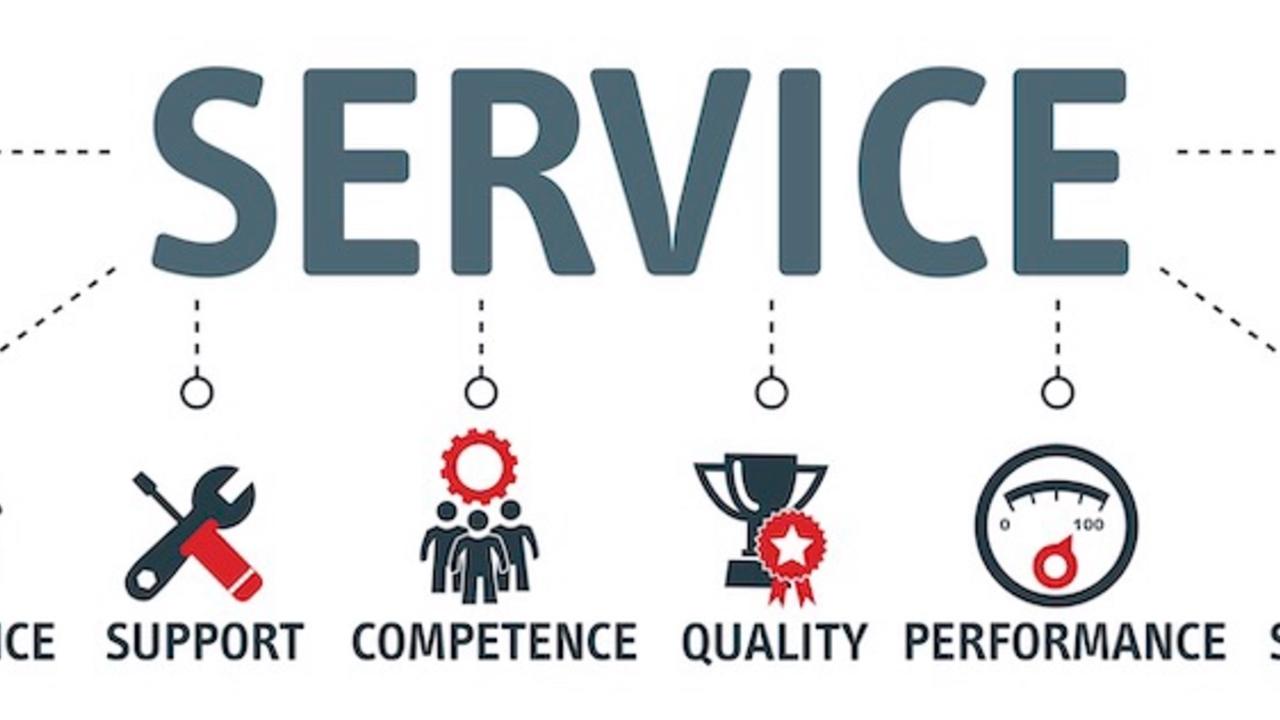New Team Assessment Platform for improving working relationships

Ever wonder why you just don't get along with certain people?
They rub you the wrong way or they aren't as responsive as you'd like?
When these people are your employees it's especially important that you have tools to resolve team conflict. Part of your role is to engage, approach, coach, inspire and lead all sorts of personality types. But we need to value, understand and know how to support them.
LeaderGov now offers a new system to help you do just that.
LeaderGov's Team Assessment System is a powerful way to compare personalities on your team and visually see how and where you are different.
Knowing how to modify your approach to others is a key to successful management. LeaderGov's new system gives you a way to better relate, coach and work cooperatively with your team.
Below is a sample of how Tim and I compare. You can use the drop down to select any team member to compare yourself to.

The LeaderGov Team Assessment System also shows the styles of everyone on ...
Do you move toward or away from problems, people, pace or procedure?

We all have natural tendencies in how we lead in local government. There are four important words that will provide insights into how you lead that all point to your overall DISC personality type. DISC is a personality assessment that helps you better understand your natural style and how your style can be an asset or sometimes lead to unhealthy leadership.
The four words are: Problems, People, Pace and Procedure
Problems: Every leader encounters problems. But how we approach them varies greatly. Do you naturally move toward problems to resolve them or do you move away from problems? Maybe you hope they'll diminish or resolve themselves. But D-style personality types naturally move toward problems. They like addressing problems directly. But if you don't naturally move toward problems (as another style), you may want to consider a more assertive stance toward problems. As we all know, unaddressed problems usually don't get better.
People: Other leaders move toward peopl...
Hiring well in local government

All great organizations have one thing in common... they hire smart, good-fit candidates onto their teams. While easily said, hiring can be a stressful and challenging. In this LeaderGov blog we'd like to share six ideas to help you supercharge your hiring processes.
- Hiring Process Input - Do you have a team of people interview each of your final 2-3 candidates or do one or two people do all the interviewing? We'd recommend that you have up to 5-7 people interview the final 2-3 candidates so you get a well-rounded view of the person. Making those interviews 1-on-1 also allows each person to get to know the candidates in a more informal setting versus a large room with five people interviewing one person at the same time. Talk about stress!
- Reference Checks - Although this is a basic idea, we usually see that these calls are to mainly check on skills. We want to encourage you to probe not only for skill capacity but ask questions about how they responded under pressure and ho ...
How to see the full picture and resist faulty conclusions as a leader

I recently read fictional stories based on real experiences from an Emergency Room doctor. He told a story about a girl who was a meth addict running into the ER with a baby that was almost dead. The addict was a mess with badly scarred arms and missing teeth. And she was not giving any helpful information as to what happened to the baby, causing great frustration among the staff. Just when the child was within a minute of dying, the doctor removed a piece of plastic blocking its airway, bringing the baby back to life.
At that very moment, another woman burst into the treatment room, picked up the baby, and thanked the drug-addicted woman for saving her baby’s life! What?!?! See, this mother was in a parking lot when her baby began to choke, but her keys were locked in her car. The drug addict was in a car nearby with her friends. She quickly grabbed the baby and left for the hospital. The ER staff first saw only an addict. But after seeing the whole picture, they also saw something v...
Leveraging a 360 Assessment for Professional Growth

Feedback is a great way to support, re-direct and encourage your employees. But as leaders in local government you can take those 1-on-1 feedback sessions one step further by asking your employee “what can I do differently to better support you or make your work more effective?” This simple feedback question allows the employee to share their concerns, it models your authenticity to them and helps you improve as a manager.
Monthly or quarterly “sit-down” feedback sessions are great, but another type of feedback called 360 Feedback can be even more transformative.
The public safety model
In local government, public safety teams regularly hold “after action” reviews of emergency calls to discuss lessons learned from an event. In those feedback sessions the group reviews the call and then determines how to reduce errors and challenges in future calls based on what they just experienced. This idea of getting a broad range of input or feedback on a situation is vital for real change ...
Resolving to be Your Best

According to a study by the University of Scranton’s Journal of Clinical Psychology, roughly forty-five (45%) of Americans make New Year’s resolutions. Seventy-five (75%) maintain them for a week and sixty-four (64%) maintain their resolutions for one month. Only forty-six (46%) maintain their resolutions for more than 6 months.
As a leader influencing your local government, it’s important to set strategic goals or resolutions for yourself each year – you might call them resolutions for your City, County or Department. While you probably have a Council or Commission or Manager eager to set goals for you, it’s important to pursue a few goals you see as vital to your team’s success.
The first step is to document your resolutions in writing. People are 50% more likely to achieve a goal if it’s written down.
A Look Back: Look back on the past year and consider what you did well and what you didn’t do so well. Consider which projects and initiatives succeeded and why they succeed...
Building Trust on Your Team

Having a high level of trust on City and County teams is paramount to the success of everything you do. Trust between individuals and teams can either stifle success or multiply success. Great sports teams who were under-rated in terms of skills often beat teams with much greater talent because they trusted each other and worked as a team.
Having a high level of trust on your team (whether it’s a department team, project team or city management team) has a range of positive benefits to those in local government. Below are a few indicators to know if you have high trust on your team:
- Is your team open to hearing honest feedback?
- Do your team members express their ideas in a transparent and honest way?
- Are your team members protective or careful in how they talk to each other?
- Do they know that the intentions of the people they work with are good?
- Does your team take input personally?
Your team may or may not have these attributes and it’s likely that you don’t have them ...
Coaching as a Strategic Development Tool for Cities and Counties

There are some great coaches that have influenced athletes over time. You probably can think of some examples.
In local government, you're the coach and the players are your employees. As with all coaching, it’s the athlete who has to carry out and execute the plans. You're not "on the field" and shouldn't be….you're on the sidelines encouraging, cheering and directing, just like a coach.
Coaching is based on the idea that you believe the person is capable of solving their own issue. Your goal is to help them develop a path to address a need by asking great questions.
Coaching is not a few things….
- Coaching is not an annual review
- Coaching is not feedback per se
- Coaching is not being someone’s friend, although you may like the person
- Coaching does not rely on your inspiration, but rather the person’s
- Coaching is not directly telling someone what to do
Coaches facilitate, they don’t offer direct input per se or micro-manage. Mainly they ask questions to get to ...
Leading in Customer Service

Whether you are Director of Finance at a City, a County Manager or a Public Works Manager, providing customer service to other departments or to citizens is everyone’s job and it’s job #1. As a leader you should be involved in the design, implementation and measurement of a customer service strategy to ensure your department is serving others well.
Citizens are becoming more and more accustomed to next day delivery and ease of shopping all brought about by customer service innovation at Amazon and other online retailers. They’ve tried to perfect the experience of shopping and they’ve raised the bar for other providers of services, including cities and counties.
In this blog we want to share six service strategies you can oversee to ensure the delivery of exceptional customer service in your department, city or county.
#1 Define Success
As a leader or manager, you should oversee the successful definition of customer service to your citizens or the employee you serve. In creating...
The Power of Productive Meetings

Most of us think of meetings as boring or dislike them for one reason or another. So, often they lack real progress, decisions are often avoided, they lack purpose, the wrong people are at the meeting or they last too long.
To avoid this history, here are three principles, you as a leader, can employ for more effective meetings:
- Consistency and clarity of purpose
- Foster healthy team debate
- Meeting agendas and best practices
Consistency and Clarity of Purpose: No one wants to hold a meeting “just to hold a meeting” and one shouldn’t. Here are just a few reasons why holding regular team meetings can add value to your team.
- Regular meetings allow for clarity on projects and assignments
- They help you reinforce important and timely goals
- They give you space to discuss and clear roadblocks for near-term goals
- They’re a great time to do some creative idea sharing around services
- They’re great for recognizing great performance and for engaging in team learning and training ...

